-
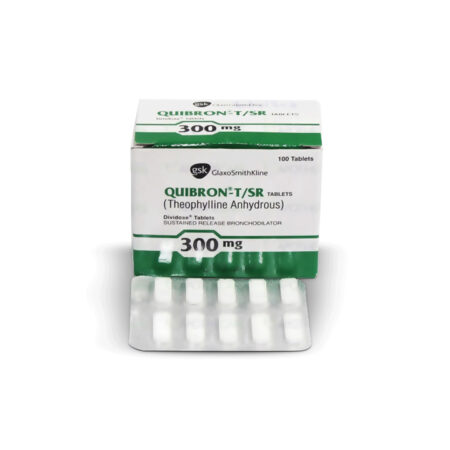
quibron-t
$33.60View productsPreventing and treating symptoms and blockage of airway due to asthma or other lung diseases (eg, emphysema, bronchitis). It may also be used for other conditions as determined by your doctor.Quibron-T is a xanthine derivative. It works by relaxing the muscle around the airways in the lungs, which allows them to widen and makes breathing easier. It also improves contraction of the diaphragm (the major breathing muscle) and decreases the response of the airways to irritants.
-
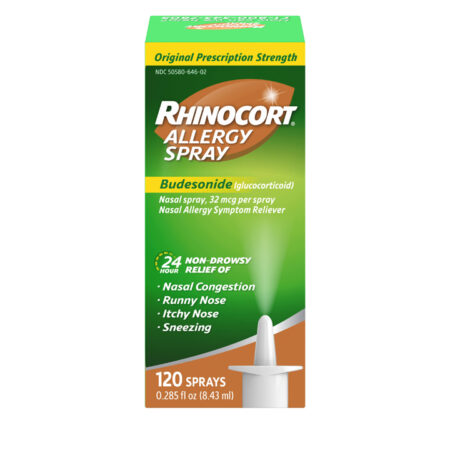
Rhinocort
$41.81View productsRhinocort is used for the control of asthma in persons requiring continuous, prolonged treatment. Such patients may include those with frequent asthmatic episodes requiring bronchodilators, or those with asthmatic episodes at night.
-
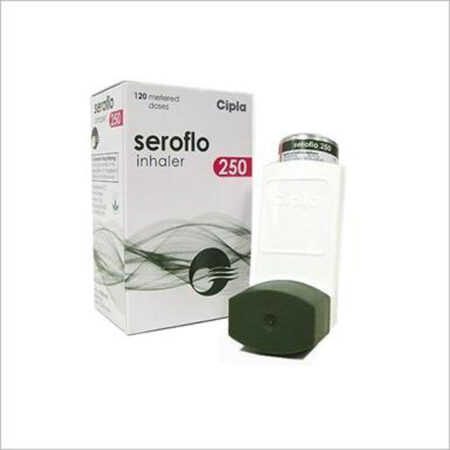
Seroflo
$111.08View productsSeroflo Inhaler is used for long-term prevention and treatment of asthma and chronic lung diseases.
-
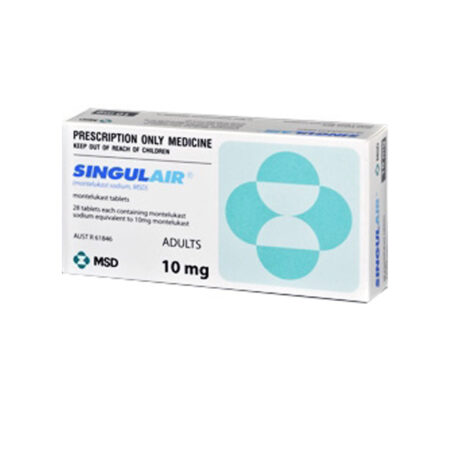
Singulair
$41.70View productsSingulair is a leukotriene (loo-koe-TRY-een) inhibitor which used for the treatment of asthma, the prevention of exercise-induced asthma, and allergic rhinitis (sneezing, stuffy nose, runny nose, itching of the nose, and outdoor and indoor allergies). Singulair blocks substances in the body called leukotrienes, which cause asthma and allergic rhinitis.You will get best result using it every day. Swallow the tablet whole with a glass of water/milk. If you are taking the chewable tablet, the tablet must be chewed before swallowed.The recommended dose for adults and children 15 years and over is 10 mg a day. For children ages 6 to 14 years old, the recommended dose is 5 mg, taken once daily. For young children 2 to 5 years old, the recommended dose is 4 mg, taken once daily. For children age 6 to 23 months old, the recommended dose is one packet of oral granules (4 mg), taken once daily. This drug should be taken once daily in the evening. Also we would like to inform that safety and effectiveness in pediatric patients less than 12 months of age have not been established.Note: this instruction presented here just for review. It’s very necessary to consult with your doctor before using. It help you to get best results.Singulair Should not be used for treatment of acute asthma attacks. Singulair Should not be abrupt substituted for inhaled for inhaled or oral corticosteroids. Pregnancy & lactation. Children greater than/above 6 years. Warning that if you have asthma and if your asthma is made worse by aspirin, continue to avoid aspirin or other medicines called nonsteroidal anti-inflammatory drugs while taking Singulair.Not allowed in patients with known hypersensitivity to any component of this product.They may include an allergic reaction: hives; difficult breathing; swelling of your face, lips, tongue, or throat. Also the most possible side effects include:skin rash, bruising, severe tingling, numbness, pain, muscle weakness;mood or behavior changes, anxiety, depression, or thoughts about suicide or hurting yourself;tremors or shaking;severe sinus pain, swelling, or irritation; orworsening asthma symptoms.Less serious include:headache;stomach pain, heartburn, upset stomach, nausea, diarrhea;tooth pain;tired feeling;fever, stuffy nose, sore throat, cough, hoarseness; ormild rash.If you experience one of them stop using Singulair and tell your doctor as soon as possible. Also consult your doctor about any side effect that seems unusual.Singulair interacts with the following medicines: cisapride; methscopolamine nitrate; nitrates like amyl nitrite, isosorbide dinitrate, isosorbide mononitrate, nitroglycerin; nitroprusside; other sildenafil products. Also this medicine interacts with: certain drugs for high blood pressure; certain drugs for the treatment of HIV infection or AIDS; certain drugs used for fungal or yeast infections, like fluconazole, itraconazole, ketoconazole, and voriconazole; cimetidine; erythromycin; rifampin. Also note that an interaction between two medications does not always mean that you must stop taking one of them. As usual it affects the effect of drugs, so consult your doctor about its interactions.If you forgot to take your dose in time, please do it as soon as you remember. But do not take if it is too late or almost time for your next dose. Do not increase your recommended dose. Take your usual dose next day at the same time regularly.If you take more dose you need in long period of time it can lead to such symptoms as thirst, drowsiness, dilated pupils, increased muscle movements, or severe stomach pain. If you experience one of them call your doctor immediately.Store at room temperature between 59-77 degrees F (15-25 degrees C) away from light and moisture, kids and pets. Do not use after expiration term.We provide only general information about medications which does not cover all directions, possible drug integrations, or precautions. Information at the site cannot be used for self-treatment and self-diagnosis. Any specific instructions for a particular patient should be agreed with your health care adviser or doctor in charge of the case. We disclaim reliability of this information and mistakes it could contain. We are not responsible for any direct, indirect, special or other indirect damage as a result of any use of the information on this site and also for consequences of self-treatment.
-
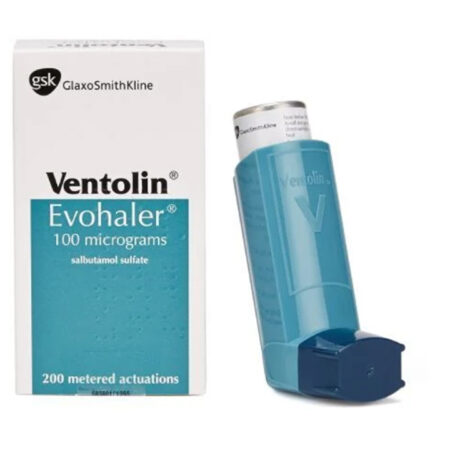
Ventolin
$36.30View productsVentolin is a selective ß2-adrenergic receptor agonist. Its therapeutic doses interact with ß2-adrenergic receptors in muscles of the bronchi. After inhalation of 10-20% of the administered dose reaches the lower respiratory tract. The medication starts to act 4-5 minutes after inhalation and does for 4-6 hours. Ventolin is used to relieve symptoms of asthma, to treat patients with chronic obstructive bronchitis.Do not use the medication more frequently than recommended. Common initial dose for inhalation is 2.5 mg, which could be increased up to 5 mg later. The solution for inhalations must be protected from microbial contamination which could spread to the patient’s mucous. Use proper aseptic techniques each time you open the bottle. Avoid any contact of the dropper tip of the bottle with any surface. Do not use the solution if it changes color or becomes cloudy.If you noticed that the medication does not help or your symptoms worsened you should check up with your doctor. Intake of other inhaled drugs and asthma medications should be done only by recommendations of your doctor. Inform your doctor about all allergic reactions you had in history and also about diabetes, heart or blood vessel disease, heart rhythm problems, hypertension, hyperthyroidism, hypokalemia, seizure disorders.Hypersensitivity to the medication or its components in history.The most common side effects are: shakiness in the legs, arms, hands, or feet, trembling or shaking of the hands or feet. More rare side effects include fast, irregular, pounding, or racing heartbeat or pulse palpitations, chest pain, rapid heart rate, and tremor or nervousness.Ventolin cannot be co-administered with other short-acting sympathomimetic aerosol bronchodilators or used with cautiousness to avoid deleterious cardiovascular effects. Simultaneous use with monoamine oxidase inhibitors or tricyclic antidepressants is contraindicated. Their intake should be administered 2 weeks later after treatment with Ventolin is finished. Beta-adrenergic receptor blocking agents are able to produce severe bronchospasm in patients with asthma and interact block the pulmonary effect of beta-agonists (Ventolin). Beta-agonists worsen hypokalemia caused by nonpotassium-sparing diuretics (such as loop or thiazide diuretics). Ventolin decreases serum levels of digoxin.If you forgot to take your dose in time, please do it as soon as you remember. But do not take if it is too late or almost time for your next dose. Do not increase your recommended dose. Take your doses at about the same time each day to avoid missing a dose.Transitory changes induced by ß2-adrenergic receptor agonists such as tachicardia, tremor, headache are symptoms of overdose. Severe hypopotassemia appears as result of Ventolin overdose.Store at room temperature away from moisture, sunlight, kids and pets in a tight container.We provide only general information about medications which does not cover all directions, possible drug integrations, or precautions. Information at the site cannot be used for self-treatment and self-diagnosis. Any specific instructions for a particular patient should be agreed with your health care adviser or doctor in charge of the case. We disclaim reliability of this information and mistakes it could contain. We are not responsible for any direct, indirect, special or other indirect damage as a result of any use of the information on this site and also for consequences of self-treatment.
